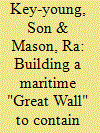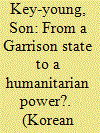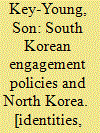| Srl | Item |
| 1 |
ID:
123029


|
|
|
|
|
| Publication |
2013.
|
| Summary/Abstract |
In this article we aim to illustrate both the progress and the stalemates of the US and Japanese strategies to fortify the Okinawan Islands as a bulwark against China. As a conceptual tool to analyze the accommodation and resistance of militarization, we use the notion of a complex interplay of state, market, and societal actors, which showcases the process of mediating and recalibrating risks perceived by policymakers in Tokyo in response to the rise of China. In this process, risk has been shifted to individual stakeholders within society. We argue that the full-scale fortification of the Okinawan Islands will be hard to achieve because of the resistance of local residents and anti-base activists, as well as China's military and commercial strategies to circumvent any form of blockade.
|
|
|
|
|
|
|
|
|
|
|
|
|
|
|
|
| 2 |
ID:
108584


|
|
|
|
|
| Publication |
2011.
|
| Summary/Abstract |
This article examines the transformation of South Korea's international security
identity from an anti-communist garrison state to a humanitarian power. Given the
frequency of its choice of non-combat troops mobilized as part of alliance obligations
and UN peacekeeping operations, South Korea can be classified as a state that
has made the dispatch of non-combat troops a norm in the case of overseas power
projection following the end of the Cold War. It argues that South Korea's normative
preference of dispatching non-combat forces on humanitarian and peacekeeping
missions has played a constitutive role in crafting the state as an international
humanitarian power, though in the initial stage of identity transformation. Given its
rise as an economic powerhouse and its international security stature as a middle
power, South Korea's transformation of security identities holds strategic significance,
not only for those on the Korean peninsula, but also for the United States and many
other countries in the world. The article first analyzes South Korea's garrison state
identity of the Cold War period and the emerging humanitarian power identity by
focusing on a shift in institutions and public opinions regarding the country's overseas
power projection. It concludes by critically reviewing South Korea's international
humanitarian activities and making a number of suggestions as to how it might
emerge as a full-fledged international humanitarian power
|
|
|
|
|
|
|
|
|
|
|
|
|
|
|
|
| 3 |
ID:
071746


|
|
|
|
|
| Publication |
London, Routledge, 2006.
|
| Description |
xv, 250p.
|
| Standard Number |
0415374383
|
|
|
|
|
|
|
|
|
|
|
|
Copies: C:1/I:0,R:0,Q:0
Circulation
| Accession# | Call# | Current Location | Status | Policy | Location |
| 051233 | 327.519505193/KEY 051233 | Main | On Shelf | General | |
|
|
|
|